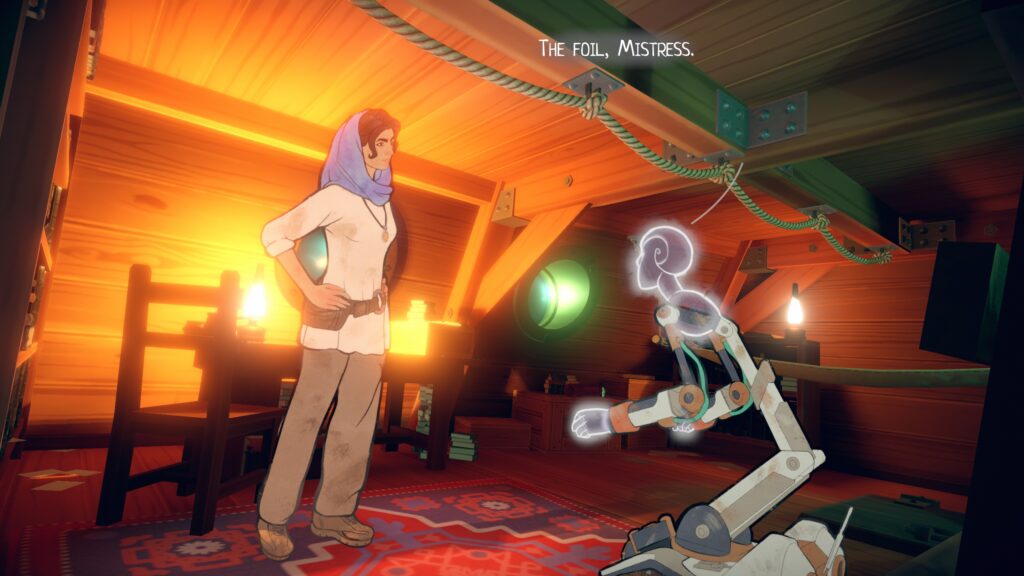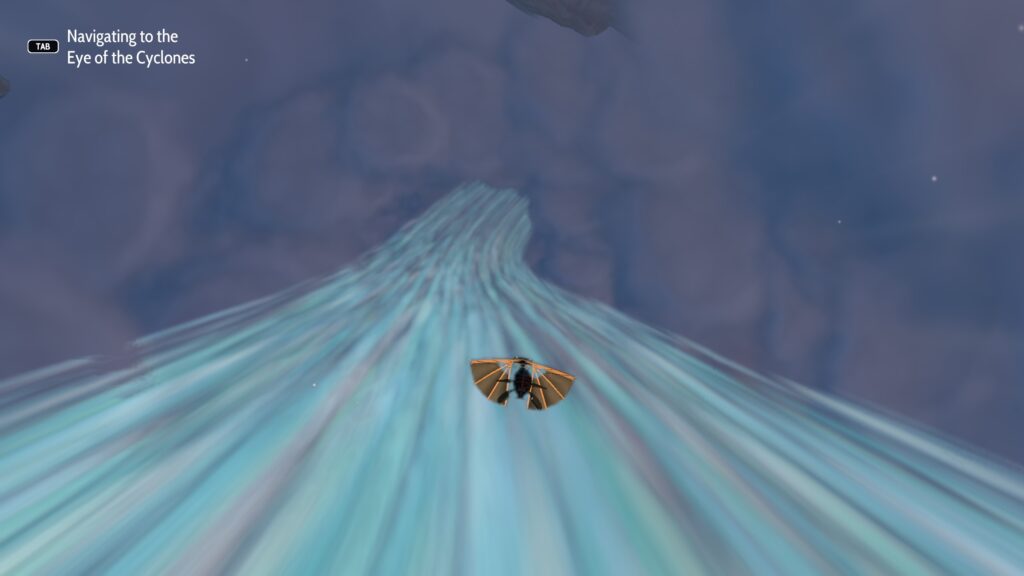
80 Days was such a unique game that I still think of it from time to time years later. So when the developer Inkle made a game that has you play as an archaeologist and the primary gameplay mechanic involves deciphering a language, I was all over it. In practice, the invented language seems too directly translatable into English to be plausible and the protagonist Aliya is a rather poor archaeologist. There’s nothing else like this game though and it is very satisfying to uncover the history of civilization of the setting so I’d still count this as a success.
Aliya Elasra works for the University on Iox, the center of a civilization in which everyone lives on land masses that are called moons. These in turn are connected by rivers flowing through space, forming the Nebula. Aliya owns a ship called the Nightingale which she uses to explore the ruins of past civilizations. Her supervisor Myari asks her to investigate the disappearance of a colleague, the roboticist named Janniqi Renba. Robots are relics of the ancients as the people of the present are no longer able to manufacture them. Still they seem to be sentient and obey orders so Myari assigns a robot to accompany Aliya, which she promptly names Six. Following the clues, Aliya soon finds that Renba was worried about an oncoming darkness that will engulf the entire Nebula and uncovered secrets about the emperors of the civilization that immediately preceded the current one. Along the way, we also learn about the power struggle between Iox and poorer moons like Elboreth where Aliya grew up as an orphan.

It’s a little hard to make sense of the setting at first because the moons aren’t really moons and how it mixes mystical concepts with science-fiction. The game is also vague about what Aliya’s job is and why is it that she is allowed to fly as she pleases throughout the Nebula when we’re told that Iox is really a kind of local hegemon. Then there’s the mix of gameplay modes as well: in addition to the mode where you decipher the Ancient language, there’s also one in which you directly control the Nightingale and sail through the spaceways and the adventure game mode in which you control Aliya as she walks around and talks to people. It turns out that it really is like an adventure game as you collect items and can trade them away and there’s even a kind of fake health mechanic in which Aliya can get injured. Managing items is really only a small part of the game, but it annoyed me as I didn’t realize that you’re expected to trade items away to get access to other items or information because there isn’t even an inventory screen in here.
Still the core idea of the game is sound and deciphering the Ancient language is the best thing in it, The way it works is that Aliya finds sample of the lost language either inscribed on the walls of ruins or on small objects or pages of books that she finds. At first you don’t know any words in Ancient so you just guess. If you encounter the same word later in another writing sample and the meaning you picked makes sense there, then the game will confirm the true meaning of the word. As the Ancient language is a hieroglyphic one, there are recognizable patterns in the symbols that you can take advantage of to make more educated guesses. You can recognize the same root symbols in different words which indicate that what they mean are related and there are small markings added to the hieroglyphs to denote verbs, nouns, adjectives and so on. Naturally the more samples of writing you find the more information you get to work with to understand everything else. That’s why I get excited whenever I find a new sample and of course reading the deciphered text gives clues as well about happened in the past.

Progress through the game means gaining access to new ruins. Uncovering clues at one ruin or talking to people can be enough to learn about the location of a new ruin. More often though you get only an approximate location and you narrow down the search space by getting more clues or collecting more artifacts originating from that place. Six explains that he is able to track the radiation signatures of the objects but the upshot is that progress is achieved through gathering these clues and coming across random ruins while sailing. As far as I can tell deciphering the Ancient language doesn’t really contribute much to game progress. There are real decisions to be made as what you decide to tell different people can result in different outcomes and as I’ve noted giving different people the objects you collect can change the outcome too.
I do love the lore and all of the ancient secrets that you can uncover from the nature of robots and emperors to the marvels that the ancients were capable of. It’s another example of the Older is Better trope but what can you do. This is counterbalanced by how weak the personal story of Aliya is. We get very little backstory about Aliya. Apparently she simply stumbles across an ancient but still seaworthy ship as a child and is somehow allowed to keep it. She nominally works for the university but isn’t really supervised at all. Six complains if she takes the artifacts she finds and sells them but that’s it. The game-like elements clash with the story too. How can she be traipsing around historical sites without carrying basic tools? It’s ridiculous that she needs to use a priceless dagger she just found as a tool to try to pry open a container. It’s very annoying too how your time at certain sites is limited while Six keeps nagging you about whether it’s time to return to the ship. You’ll end up missing a lot of clues if you actually listen to Six and prematurely stop your exploration.

Even though this isn’t a very long game, there’s a fair amount of repetitiveness as you voyage between sites, the capital of Iox and your birth world of Elboreth. Scene transitions take quite some time and there are a few that you do over and over again. The game grabs control of Aliya sometimes and it’s not at all clear when you can move her around and when you can’t. It also deliberately slows you down by limiting the number of artifacts you can hand in to your colleague Huang at the university or prevents some characters from being able to talk to you until you leave the planet and come back again. While talking to Six, you get the choice of either asking a question or responding to something but there’s no way to tell in advance what Aliya is actually going to say so it feels like a choice that is meaningless. The game layer is just full of all kinds of frustrations.
It really is a unique game though and even if the Ancient language turns out to be not that complex, it’s a gameplay mechanic unlike anything I’ve seen elsewhere. As an archaeologist, Aliya’s practices and habits leave a lot of be desired but this still is a game that really is about archaeology. I wished Aliya’s personal story made more sense but the story of the Nebula as a whole and its history is well written and satisfying to learn. This is a more ambitious game than Inkle’s previous titles and I feel that they may have tried to do a little too much. Still it’s so different than anything else and the things that it does get right works so well that I love it all the same.
One thought on “Heaven’s Vault”